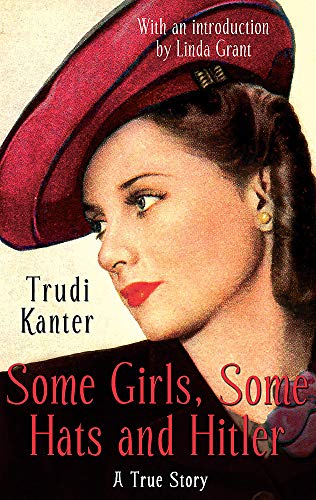Customer Services
Copyright © 2025 Desertcart Holdings Limited


Full description not available
S**N
Highly recommended! A must read !!
"Some Girls, Some Hats and Hitler." I read this in a day. This is an excellent book. I highly recommend it, whatever your gender. Great writing style, evocative but spare. A glimpse of the beautiful, exciting, cosmopolitan, modernist world of the interwar period.There were shocking insights into how quickly "decent" people tolerate the most abhorrent practices, slurs, and propaganda against their neighbours, colleagues, and fellow citizens. It's a quick read, and despite the period and circumstances, not a deeply depressing or earnest tome, but history, written by a person who lived, loved, and survived it, day by day.An excellent social history, it recounts a contemporary existence, beautifully rendered. Although it paints a picture of a cultural life, fashions, opulence, and lifestyle from a very defined period, the experiences and events she writes about then are highly relevant today: Ukraine invasion, Brexshitty neo fascism, anti immigrant & anti refugees rhetoric and behaviour, raging nationalism, tabloid press brainwashing the public to take against "foreigner".Brought out some great discussion in our book group including: treatment of women's stories in a male-dominated war [HIS]tory narrative; the reception of refugees, then and now; and how we would cope with the trauma of having to pack up one's life in a suitcase and walk away. Some of the book group members are working with Ukrainian refugees, who have had to do just that.Included the intro below to illustrate why this is a "YOU MUST READ IT NOW, RIGHT NOW"[Trudi Kanter was a witness to history, but she saw it from an unusual angle, that of an ambitious, romantic, sexy, half-Jewish businesswoman in the fashion industry. For even in Nazi Vienna, she realised, women still looked in the mirror. From such an oblique viewpoint, we can observe how the lives of middle-class women went on, or were interrupted by the tectonic plates of the twentieth century, and how some people survived through sheer chutzpah and others went under.In the early 1980s, when she was approaching eighty herself, Trudi Kanter wrote a book, a memoir of her great love story: her marriage to Walter, the love of her life, and how this disciplined, wily woman got the two of them out of Austria to safety in London. It was published by a small press, went out of print and was forgotten, which seems unjust, for Trudi was a natural writer; her prose fizzes with vitality, energy, humour and a pinpoint recall of what she regards as beautiful.The mid-eighties was a time when the memoir had yet to become fashionable, and before publishers had become interested in accounts of the Holocaust by ordinary individuals, so Trudi had two strikes against her. There was, too, I think, an instinctive shrinking away from accounts of the war which did not treat it with the seriousness and solemnity of historians. She must have seemed too shallow, too preoccupied with hats and men to be a sympathetic narrator of the life of the refugee. After all, the émigrés and exiles who flooded to England in the Thirties, Sigmund Freud amongst them, were conductors, composers, poets, publishers and cinematographers. Milliners were de trop. Her book went down into oblivion. Some readers believed it to be a novel.And yet one hundred and seven years after her birth Trudi Kanter seems now to be a heroine for the modern age: successful, independent, smart and determined.Trudi was a survivor. Her book is also about the appetite for life: for clothes and hats and food and cocktails and sex and furnishings and good company and conversation. She knows that even in the bleak darkness, we feel, love, desire. She left no child (she and Walter tried, with no success); her hats are long lost, but her book is her legacy, discovered once again." LINDA GRANT]PS: Little known fact - her husband was responsible for solving one of De Havilland's major problems with the Mosquito plane which allowed the plane to go into full-scale production. Although he could have made real money from his invention, he never claimed his financial rights as patent holder, in grateful thanks as a refugee who was given a home here, escaping death and persecution from his homeland.
L**Y
Great
Great
N**N
I loved it
I loved this book. I have read much of the detailed more academic writings about this period but this book is all the more powerful for it's brevity and simplicity. My mother came to London in late 1937 from Vienna and as I turned the pages I expected to see her mentioned as one of Trudi's friends amongst the Viennese community in London. Trudi's accounts of the situation in Vienna and what she encountered when settling in London rings so true with what my mother has told me. This book will stay with me for a very long time. My favourite book of 2012 so far.
T**R
An unusual look at World War II
Very gripping, exciting and at the same time very informative about how internees were treated in Britain. A remarkable and unusual autobiography, gripping to read as one is sympathetic to all the characters involved.
K**N
funny sad inspiring
I did not want this novel to end. Trudi is intelligent and hard-working and writes with dry humour and a spare sty;e which underscores the horrors of her life under Nazi rule.
P**E
recommended to me
I enjoyed it to a certain degree, but was a little disappointed since it had been recommended. Perhaps I didnt really 'get into' the main characters of the story
J**2
Good read!
I enjoyed this! It was well written and has a good storyline. The historical element to it was true as well.
H**N
for those who like it
OK but not my kind of reading
Trustpilot
3 days ago
5 days ago